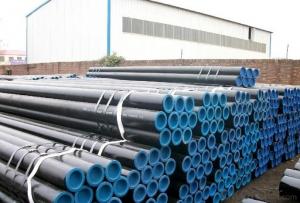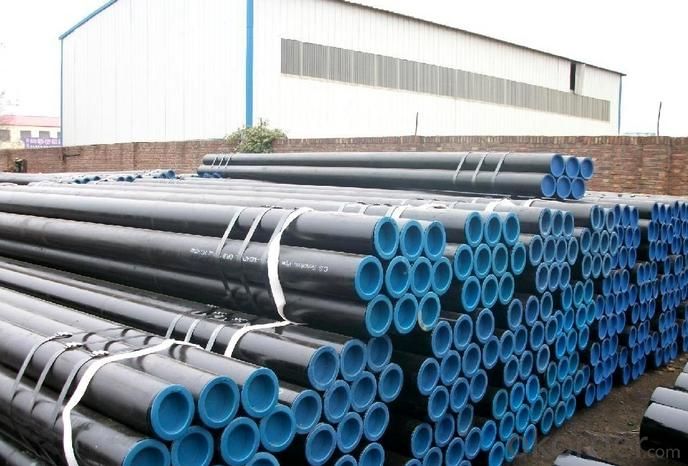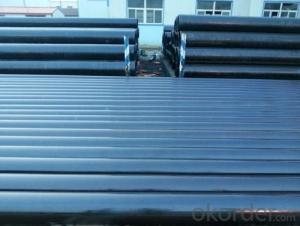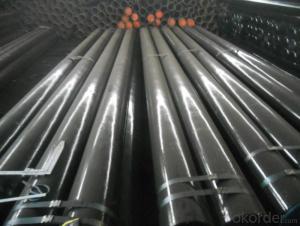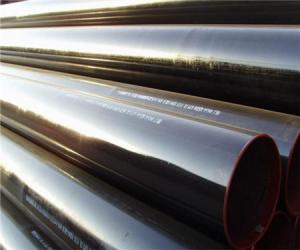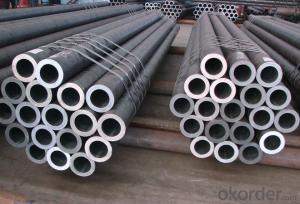Seamless pipe ASTM A53/ASTM A 106/API 5L grade B
- Loading Port:
- Tianjin
- Payment Terms:
- TT OR LC
- Min Order Qty:
- 10 m.t.
- Supply Capability:
- 5000 m.t./month
OKorder Service Pledge
OKorder Financial Service
You Might Also Like
1. Commodity Name: Seamless steel pipe
2. Standard: API,GB,ASTM,ASME,DIN
3. Quality grade: 10#, 20#, A106B, A53B, API 5L B, Q235, Q345, ST37-2, ST 45, ST52.etc.
4. Dimension:
OD: 1/2"-24"
WT: 2.5-80mm, SCH10~SCH40~XXL
length: 5.8m,6m,8m,9m,12m
5. Technique: Hot Rolled/Cold Rolled/ Cold Drawn
6. application
carbon seamless steel pipes are widely used in gas, water and oil, transpotation;constructions;Bridge,highway,windows of model steel door; building materials;fences;heating facilities Fluid Pipe;conduit pipe,scaffolding pipe.etc.
7. Payment Terms: L/C D/A D/P T/T
8.packing and shipment
Packaged in bundles,as per customers' requirements, it can also bepackagesd as beveled ends, typed marking, black painting, plastic caps protection,woven bags packing
For 20" container the max length is 5.8m; For 40" container the max length is 12m. other options are available based on customer requests. Please discuss when placing orders.
9. Surface: painted with varnish;
10. Plastic caps at ends.
11. Tolerance: OD +1%/-1%
WT +12.5%/-10%
12. Chemical composition:
Models of Steel Pipes | Chemical Component | |||||||
Steel 20 (ASTM A106B) | C | Si | Mn | P | S | Cu | Ni | Cr |
0.17~0.24 | 0.17~0.37 | 0.35~0.65 | 0.035max | 0.035max | 0.25max | 0.25max | 0.25max | |
Steel45 (ASTM 1045) | 0.42~0.50 | 0.17~0.37 | 0.50~0.80 | 0.035max | 0.035max | 0.25max | 0.25max | 0.25max |
16Mn(Q345B) | 0.12~0.20 | 0.20~0.55 | 1.20~1.60 | 0.035max | 0.035max | 0.25max | 0.25max | 0.25max |
45Mn2 ( ASTM1345) | 0.42~0.49 | 0.17~0.37 | 1.40~1.80 | 0.035max | 0.035max | 0.3max | 0.3max | 0.30max |
- Q: How do you inspect steel pipes for defects?
- The inspection of steel pipes for defects requires a methodical approach that combines visual examination, non-destructive testing (NDT) techniques, and specialized equipment. The following are the typical steps undertaken to inspect steel pipes for defects: 1. Visual Examination: Commence by visually inspecting the external surface of the pipe, searching for any visible indications of defects, including cracks, dents, or corrosion. Particular attention should be given to welds, joints, and areas prone to stress or damage. 2. Ultrasonic Testing (UT): Ultrasonic testing is commonly employed to identify internal defects in steel pipes. This technique involves transmitting ultrasonic waves into the pipe and then interpreting the echoes received. Any irregularities in the internal structure, such as cracks or voids, can be identified and analyzed. 3. Magnetic Particle Inspection (MPI): MPI is a widely utilized technique for detecting defects on or near the surface, such as cracks, seams, or other discontinuities. This method involves applying a magnetic field to the pipe and subsequently applying ferromagnetic particles (usually iron-based) to the surface. These particles accumulate and form visible indications at areas where magnetic flux leakage is caused by defects. 4. Eddy Current Testing (ECT): Eddy current testing is suitable for detecting surface and near-surface defects in conductive materials like steel. This technique involves inducing an alternating current into the pipe and monitoring changes in the electrical currents induced by any present defects. These changes are then analyzed to identify and evaluate the defects. 5. Radiographic Testing (RT): Radiographic testing is conducted by exposing the steel pipe to X-rays or gamma rays and capturing radiographic images of the pipe. This technique allows for the detection of internal defects, such as cracks, porosity, inclusions, or variations in wall thickness. The radiographic images are subsequently examined for any indications of defects. 6. Dye Penetrant Inspection (DPI): DPI is a method used to identify defects on the surface of steel pipes. It involves applying a liquid dye to the surface, which penetrates into any surface cracks or flaws. After sufficient time for the dye to seep in and react, excess dye is removed, and a developer is applied to draw out the dye from the defects, rendering them visible. 7. Pressure Testing: Pressure testing entails pressurizing the steel pipe to a predetermined level and monitoring for any pressure drops or leaks. This test ensures that the pipe can withstand the required pressure without any structural defects. It is worth noting that the choice of inspection technique depends on various factors, such as the type of defect being sought, the size and characteristics of the pipe, and the specific industry standards and regulations. Inspection professionals with expertise in NDT methods and equipment are typically employed to ensure precise and dependable results.
- Q: Can galvanized steel tubes simmer?
- Galvanized pipe bending is one of the elbow, the surface of the pipe is coated with a layer of zinc material to improve the corrosion resistance of the elbow. Galvanized pipe bending hot galvanized and galvanized two kinds, hot galvanized, zinc coating thickness, zinc plating cost is low, the surface is not very smooth. Galvanized pipe bending cold tube, hot tube, the former has been banned, and the latter is also advocated by the state for the time being.
- Q: How are steel pipes used in the agriculture sector?
- Steel pipes are commonly used in the agriculture sector for various purposes such as irrigation systems, water transportation, and structural support for greenhouse structures. They are also used for the construction of livestock enclosures and handling equipment. Overall, steel pipes play a crucial role in ensuring efficient and reliable operations in the agriculture industry.
- Q: What are the different types of couplings used with steel pipes?
- There are several types of couplings that can be used with steel pipes, including threaded couplings, compression couplings, and flanged couplings. Threaded couplings have threads on the inside and outside that allow pipes to be screwed together. Compression couplings use a compression fitting to connect pipes, providing a tight and secure connection. Flanged couplings have flanges on each end that are bolted together, creating a strong and durable joint.
- Q: What's the gate number of the precision steel pipe?
- This kind of steel tube and ordinary hot-rolled seamless steel pipe and cold drawn seamless steel tube in the outer surface is different from the outer surface, and the diameter of the smooth finish of precision steel tube, stainless steel color and the same, inside and outside surface due to manufacturing reasons with a layer of oil.
- Q: How are steel pipes protected against external mechanical damage?
- Steel pipes are often protected against external mechanical damage through a variety of methods such as applying corrosion-resistant coatings, using protective sleeves or wraps, and implementing casing or encasement systems. These measures help to safeguard the pipes from potential physical harm caused by external factors like impact, abrasion, or heavy loads, thus ensuring their integrity and longevity.
- Q: What are the different sizes available for steel pipes?
- Steel pipes are available in a wide range of sizes, ranging from small diameters as small as 1/8 inch to larger diameters exceeding 72 inches. The sizes of steel pipes are typically measured based on their outside diameter (OD) and wall thickness, with various standard sizes available to meet different application requirements.
- Q: How are steel pipes used in the manufacturing of machinery?
- Steel pipes are used in the manufacturing of machinery primarily for conveying fluid or gas, providing structural support, and acting as a conduit for electrical wiring. They are commonly used as the framework for various machine components, such as conveyor systems, hydraulic equipment, and pneumatic systems. Steel pipes offer durability, strength, and versatility, making them an essential material in machinery manufacturing.
- Q: Can steel pipes be used for high-temperature applications?
- Yes, steel pipes can be used for high-temperature applications. Steel is known for its excellent strength and durability, making it suitable for handling high temperatures. However, the specific grade of steel used and the operating conditions must be considered to ensure it can withstand the desired temperature range without compromising its structural integrity.
- Q: What is the difference between steel pipes and fiberglass-reinforced pipes?
- The main difference between steel pipes and fiberglass-reinforced pipes lies in their composition and structural characteristics. Steel pipes are made of a durable metal alloy, typically carbon steel, which provides strength and resistance to high pressure and temperature. On the other hand, fiberglass-reinforced pipes are composed of a plastic matrix reinforced with glass fibers, making them lightweight, corrosion-resistant, and suitable for various applications. While steel pipes are commonly used in industrial settings, fiberglass-reinforced pipes are often utilized in sectors requiring corrosion resistance, such as chemical processing, wastewater treatment, and oil and gas industries.
Send your message to us
Seamless pipe ASTM A53/ASTM A 106/API 5L grade B
- Loading Port:
- Tianjin
- Payment Terms:
- TT OR LC
- Min Order Qty:
- 10 m.t.
- Supply Capability:
- 5000 m.t./month
OKorder Service Pledge
OKorder Financial Service
Similar products
Hot products
Hot Searches
Related keywords

